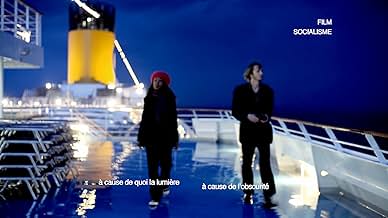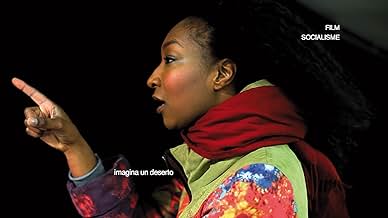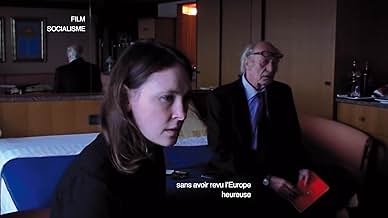Film socialisme
- 2010
- Tous publics
- 1h 42min
NOTE IMDb
5,7/10
3 k
MA NOTE
Les passagers d'une croisière en Méditerranée profitent de leur luxe tandis qu'une petite famille se bat contre l'attention excessive des médias.Les passagers d'une croisière en Méditerranée profitent de leur luxe tandis qu'une petite famille se bat contre l'attention excessive des médias.Les passagers d'une croisière en Méditerranée profitent de leur luxe tandis qu'une petite famille se bat contre l'attention excessive des médias.
- Réalisation
- Scénario
- Casting principal
- Récompenses
- 5 victoires et 2 nominations au total
Agatha Couture
- Alissa (segment "Des choses comme ça")
- (as A. Couture)
Mathias Domahidy
- Mathias (segment "Des choses comme ça")
- (as M. Domahidy)
Quentin Grosset
- Ludovic (segment "Des choses comme ça")
- (as Q. Grosset)
Maurice Sarfati
- (segment "Des choses comme ça")
- (as M. Sarfati)
Nadège Beausson-Diagne
- Constance (segment "Des choses comme ça")
- (as N. Beausson)
Dominique Devals
- (segment "Des choses comme ça")
- (as D. Devals)
Marine Battaggia
- Florine "Flo" Martin (segment "Quo vadis Europa")
- (as M. Battaggia)
Avis à la une
Can we all get over the "challenging" provocations that this Film attempts to offer. Forgive a potential Agism, but in the spirit of class conscious critique: This is a sign of late Godard, complicit in his Bourgeois canonization, making ineffectual meditations on a a medium already robust, ubiquitous and politically affective. I'm speaking of course about Video. A previous reviewer mentioned Ryan Tracartin - This film is at least 20 years behind Ryan Trecartin's most trivial undergrad work. Godard mobilizing the distancing, alienating politics of a pseudo-left closeted Eurocentrist in order to promulgate a consistent dominance over "Art House" cinema. Honestly what the blood is this film? a further denigration of the kinds of education received in low income areas of the United States, Northern Africa, Southeast Asia and Eastern Europe? Who is this this film standing up for? and if it stands up for no one then why is this nihilism necessary? The fractured subtitles are absolutely insulting - There is no transformative translation ala Benjamin, no generative deconstruction, no Stein, no Saurraute , no performative language at all - we are left with nothing but masturbatory sloganism (and not a kind of sloganism which implodes on itself in order to critique a contemporary state of language, rather a sloganism which, with full self awareness, alienates all those accept for the most privileged, most geographically/economically/culturally entitled). This film is no "challenge" to its audience as the audience for late Godard is ALREADY educated, already leftist (or at least conventionally Liberal) already enlightened as to the ornate delicacies of high cinema and already aware of and experienced with cultural forms outside of the myopic mainstream. Therefore, this film seems unnecessarily difficult, a poorly informed cloying attempt at relevance in a digital age. The Film says nothing about its medium other than a tired Brechtian breaking of verisimilitude at the beginning (a fruitless technique, as video implicitly points to its own making(s) given its unmistakable and highly recognizable fidelity) and is years behind even the most the primitive works of contemporary video art. It seems Godard did not realize the impact that Histoire(s) du cinema had on the rest of the world, and that the rest of the world has taken something he helped to pioneer and ran far far away from beyond it. I can't help but feel that Harun Farocki already made this film in the 80s and it was far more innovative, "challenging", inclusive and all around less insulting than this ultimately apolitical irreverency. There is nothing about identity in this film and an absolute disregard for the filmmaker's own place of power in the discursive grid (ie, heterosexual, white, wealthy, Western, mutilingual, gendered male).
to the reviewer who in response to the fractured subtitles said "you should learn French!" - maybe in another lifetime free of inhibitory systemic inhibitors, financial constraint and economic-racial-historical determinism we could all take up this task of Eurocentric cultural Enlightenment, but for now I'll settle for at least a concession of legibility.
to the reviewer who in response to the fractured subtitles said "you should learn French!" - maybe in another lifetime free of inhibitory systemic inhibitors, financial constraint and economic-racial-historical determinism we could all take up this task of Eurocentric cultural Enlightenment, but for now I'll settle for at least a concession of legibility.
It was eagerly awaited for years,the trailer which was the whole film in fast motion looked ravishing, and it seemed as if in this,perhaps his last film,Godard would deliver his final testament,a summation of all the themes which have run through his work for the last fifty years.From the beginning it looks absolutely stunning.In its high def cinematography the colours are gorgeous,the Mediterranean setting recalling that of Le Mépris ,but whereas the latter film was a profound meditation on European culture and civilisation,here the characters spout banal platitudes about politics or philosophy as the ship sails along past various cities; in the Spanish section there is a scene of a bullfight,in the Italian section a clip from a Rossellini film,it's that predictable.
In the final section the film switches to one of Godard's favourite subjects,the daily routine of a family with young children who run a petrol station and have for no apparent reason a pet llama.Here finally the film shows some kind of rapport with its characters but it is already too late.Yet despite its faults it still exhibits all the hallmarks of Godard's style,the brilliance of his framing and editing,the crucial way sound plays against image,but the feeling persists that perhaps he has no longer anything to say.
In the final section the film switches to one of Godard's favourite subjects,the daily routine of a family with young children who run a petrol station and have for no apparent reason a pet llama.Here finally the film shows some kind of rapport with its characters but it is already too late.Yet despite its faults it still exhibits all the hallmarks of Godard's style,the brilliance of his framing and editing,the crucial way sound plays against image,but the feeling persists that perhaps he has no longer anything to say.
I get quite excited at the prospect of a new Godard. Not that I see his work as any ultimate example. It's not. But somehow it is in a different milieu to most films you can watch. Like poetry, it's not about the words or images, but the joy that comes from exploring, from original thought. Sound and vision used not to entertain but to seek deeper levels than can be expressed in prose or 'narrative cinema as we know it.' Yet the slew of bad reviews prepared me for the worst. Perhaps age had caught up with the grand master of Nouvelle Vague? Or perhaps Godard was not beyond playing a joke on his audience, just to see what they make of it?
Omens weren't great. A small auditorium and no more than a dozen people there as I walk in. Some obviously by mistake. As they walk out halfway through. But I am already entranced. Wondering if I will be able to see it again in the final screening tomorrow. Looking forward to the DVD so I can stop-start for quotes that send my head spinning like I'm back in my alma mater's philosophy class. A dizzying array of original and masterly techniques. And, like poetry, enough fluidity to offer meanings in ways that suit the individual viewer (persons who walked out excepted).
A warning: there is a 'looking for answers' but no real story. On a difficulty level, this film is much harder than Breathless, Le Mepris, or Vivre Sa Vie. It is warmer and more captivating than Weekend or Made in USA, but only just. Neither does it have the clear expository style of his last most recent well-known movie, Notre Musique. It has three main sections: 1 - scenes on a Mediterranean cruise ship ('Things'), 2 - a European family ('Our Europe'), and 3 - scenes of conflict and war ('Humanities'). Each seeks understanding to certain questions on an individual, interpersonal and political level.
The first section held my attention the most. Inside the cruise ship is a plethora of "things" (if this was Godard of yesteryear, I'd maybe have written 'bourgeois distractions.') Only when we go outside, or see the light shine in, do we experience crisp photography, scenes of genuine beauty, and people spending their time at least trying to solve some of life's deeper puzzles. Perhaps this is just my own interpretation, but I like the way it is depicted visually. Money is a 'common good' – like water – but party-people onboard use it for nothing but bloated consumerism. Meaningless dance classes and revelry. As two people engage in philosophical discourse outside the main hall, a woman repeatedly falls against the glass partition. Is she dancing and letting her spirit free? Apparently not – she falls face down into the swimming pool.
There is a young girl seen frequently with an old man. Something strange there? A hooker perhaps? A maybe rather a scholar or seeker of truth – availing herself of the rich variety of elderly experience onboard (a philosopher, a UN bureaucrat, a Palestinian ambassador, and so on).
Characteristic Godardian effects are used with casual precision. There is no attempt at reality if it stands in the way of the point he is making. Such as when the background noise cuts out momentarily for the word 'happiness' to occurs in the girl's dialogue. Deliberate camera distortions emphasise an alcohol-sodden mentality of the majority of passengers, images often obscenely blurred, as if taken on a mobile phone. Or the mother in Section Two who talks to the camera about how she is totally unaware of the part she is playing.
There are more hidden references than an afternoon of Tarantino movies. Except, unlike Tarantino's work, Godard is not entertaining pub quiz movie geeks; but giving clues to further meanings within his experimental and exploratory work. A young lad gives a young woman a copy of 'La Porte Entroite,' (a coming of age novel). There are nods to Husserl's philosophical geometry which fit the film but will need hours of study to fully appreciate (we see a projection of a man lecturing on 'geometry as origin' – to an empty auditorium). And Balzac's 'Illusions Perdues,' which anticipates themes of aristocracy vs poverty as well as journalism as intellectual prostitution. And don't miss the homage later to Battleship Potemkin's Odessa Staircase slaughter.
Dialogue sparkles from witty – "The United Nations have been somewhat disunited since 1948," to surreal and Zen-like – "Once in 1942 I have encountered nothingness . . ." I'm quoting from memory and leaving the end of the quote for you to enjoy on screen.
The individual's relation to government is addressed by the adolescents in the second Section, posing a difference between the State and Society. The dream of the State is to be 'one'; whereas the dream of the Individual is to be two, to 'pair up.' Aggressively intrusive foreigners demanding driving directions are given a cold shoulder ("Go and invade some other country!") An intrusive camera, making a documentary about a coming election, similarly distances everyone from any (inner) reality.
Some of the phrases from Section Two bleed over into scenes of Section Three bloodshed. The young girl wants people to, "learn to see before learning to read." Godard's intertitles come fast and frequent, and in many different languages. At one point, a prayer in Hebrew and a prayer in Arabic are overlaid, visually and aurally. It recalls Godard's offhand response to the question, "Peace In the Middle East - when?" by replying, "As soon as Israel and Palestine introduce six million dogs and stroll with them as neighbours who don't speak, who don't speak of something else." Cinema is a remarkable opportunity sometimes to communicate without speaking those things which are often too difficult, or too sensitive, or simply whitewashed of their core by aimless chatter. Or by narrative movies.
Omens weren't great. A small auditorium and no more than a dozen people there as I walk in. Some obviously by mistake. As they walk out halfway through. But I am already entranced. Wondering if I will be able to see it again in the final screening tomorrow. Looking forward to the DVD so I can stop-start for quotes that send my head spinning like I'm back in my alma mater's philosophy class. A dizzying array of original and masterly techniques. And, like poetry, enough fluidity to offer meanings in ways that suit the individual viewer (persons who walked out excepted).
A warning: there is a 'looking for answers' but no real story. On a difficulty level, this film is much harder than Breathless, Le Mepris, or Vivre Sa Vie. It is warmer and more captivating than Weekend or Made in USA, but only just. Neither does it have the clear expository style of his last most recent well-known movie, Notre Musique. It has three main sections: 1 - scenes on a Mediterranean cruise ship ('Things'), 2 - a European family ('Our Europe'), and 3 - scenes of conflict and war ('Humanities'). Each seeks understanding to certain questions on an individual, interpersonal and political level.
The first section held my attention the most. Inside the cruise ship is a plethora of "things" (if this was Godard of yesteryear, I'd maybe have written 'bourgeois distractions.') Only when we go outside, or see the light shine in, do we experience crisp photography, scenes of genuine beauty, and people spending their time at least trying to solve some of life's deeper puzzles. Perhaps this is just my own interpretation, but I like the way it is depicted visually. Money is a 'common good' – like water – but party-people onboard use it for nothing but bloated consumerism. Meaningless dance classes and revelry. As two people engage in philosophical discourse outside the main hall, a woman repeatedly falls against the glass partition. Is she dancing and letting her spirit free? Apparently not – she falls face down into the swimming pool.
There is a young girl seen frequently with an old man. Something strange there? A hooker perhaps? A maybe rather a scholar or seeker of truth – availing herself of the rich variety of elderly experience onboard (a philosopher, a UN bureaucrat, a Palestinian ambassador, and so on).
Characteristic Godardian effects are used with casual precision. There is no attempt at reality if it stands in the way of the point he is making. Such as when the background noise cuts out momentarily for the word 'happiness' to occurs in the girl's dialogue. Deliberate camera distortions emphasise an alcohol-sodden mentality of the majority of passengers, images often obscenely blurred, as if taken on a mobile phone. Or the mother in Section Two who talks to the camera about how she is totally unaware of the part she is playing.
There are more hidden references than an afternoon of Tarantino movies. Except, unlike Tarantino's work, Godard is not entertaining pub quiz movie geeks; but giving clues to further meanings within his experimental and exploratory work. A young lad gives a young woman a copy of 'La Porte Entroite,' (a coming of age novel). There are nods to Husserl's philosophical geometry which fit the film but will need hours of study to fully appreciate (we see a projection of a man lecturing on 'geometry as origin' – to an empty auditorium). And Balzac's 'Illusions Perdues,' which anticipates themes of aristocracy vs poverty as well as journalism as intellectual prostitution. And don't miss the homage later to Battleship Potemkin's Odessa Staircase slaughter.
Dialogue sparkles from witty – "The United Nations have been somewhat disunited since 1948," to surreal and Zen-like – "Once in 1942 I have encountered nothingness . . ." I'm quoting from memory and leaving the end of the quote for you to enjoy on screen.
The individual's relation to government is addressed by the adolescents in the second Section, posing a difference between the State and Society. The dream of the State is to be 'one'; whereas the dream of the Individual is to be two, to 'pair up.' Aggressively intrusive foreigners demanding driving directions are given a cold shoulder ("Go and invade some other country!") An intrusive camera, making a documentary about a coming election, similarly distances everyone from any (inner) reality.
Some of the phrases from Section Two bleed over into scenes of Section Three bloodshed. The young girl wants people to, "learn to see before learning to read." Godard's intertitles come fast and frequent, and in many different languages. At one point, a prayer in Hebrew and a prayer in Arabic are overlaid, visually and aurally. It recalls Godard's offhand response to the question, "Peace In the Middle East - when?" by replying, "As soon as Israel and Palestine introduce six million dogs and stroll with them as neighbours who don't speak, who don't speak of something else." Cinema is a remarkable opportunity sometimes to communicate without speaking those things which are often too difficult, or too sensitive, or simply whitewashed of their core by aimless chatter. Or by narrative movies.
Far to be a Godard admirer, I was real seduced by this film, a mix of cultural references about Mediteranean area, a good pledge for language as obstacle of understanding, eccentric, innovative, absurd in essence, proposing characters and theirs memories and believes , but not exactly a story.
A film about time and masks and past and facts as pieces of puzzle , it is a provocative invitation to viewer to create his explanations or - and doubts.
For me, the old watch is the main scene defining this film who remains a clash by fragments of doczmentary, stains of kitsch and rediscover of past. All, in essence, in the most honest manner.
A film about time and masks and past and facts as pieces of puzzle , it is a provocative invitation to viewer to create his explanations or - and doubts.
For me, the old watch is the main scene defining this film who remains a clash by fragments of doczmentary, stains of kitsch and rediscover of past. All, in essence, in the most honest manner.
Film socialisme (2010)
BOMB (out of 4)
How does one go about explaining Jean-Luc Godard's FILM SOCIALISME? I guess you could say that the director just throws at us various film clips. Some take place on a ship. Some take place in Egypt. Some just seem to be random shots of people walking around. Some are film in beautiful HD while others are filmed on what appears to be a very old cell phone. The subtitles are often full of mistakes. It could be that the words are put together to where it's hard to read them. It could be that the subtitles aren't really telling us what the characters are saying. Was there a point to this madness? I think there are two possibilities. One is that Godard wanted to drive people to suicide so he made this film. The other theory of mine is that he wanted to make a film so horrid that his followers would still rave about how great it was. Either way this here is a pretty worthless film and it's not that it's horrible because of a horrible filmmaker. No, it's horrible because the filmmaker knows he's making something that is nothing but a waste of time. The reason Godard does this is beyond me but sitting through this film is quite unpleasant and it makes one realize that this film is so bad that you couldn't even recommend it to those who love bad movies. I'm not going to lie and say Godard is one of my favorite filmmakers because he isn't. There have been highly respected films of his (like ALPHAVILLE) that I simply hated. With that said, I could see why some would be drawn to it. With this movie it's just pure garbage and I must admit that I find it funny reading so many reviews that call this a piece of art and one of the greatest films of the decade. Reading Roger Ebert's review states that Godard showed this film in a four-minute version by playing it with the fast-forward button on high. This here might have been the greatest idea the director ever had.
BOMB (out of 4)
How does one go about explaining Jean-Luc Godard's FILM SOCIALISME? I guess you could say that the director just throws at us various film clips. Some take place on a ship. Some take place in Egypt. Some just seem to be random shots of people walking around. Some are film in beautiful HD while others are filmed on what appears to be a very old cell phone. The subtitles are often full of mistakes. It could be that the words are put together to where it's hard to read them. It could be that the subtitles aren't really telling us what the characters are saying. Was there a point to this madness? I think there are two possibilities. One is that Godard wanted to drive people to suicide so he made this film. The other theory of mine is that he wanted to make a film so horrid that his followers would still rave about how great it was. Either way this here is a pretty worthless film and it's not that it's horrible because of a horrible filmmaker. No, it's horrible because the filmmaker knows he's making something that is nothing but a waste of time. The reason Godard does this is beyond me but sitting through this film is quite unpleasant and it makes one realize that this film is so bad that you couldn't even recommend it to those who love bad movies. I'm not going to lie and say Godard is one of my favorite filmmakers because he isn't. There have been highly respected films of his (like ALPHAVILLE) that I simply hated. With that said, I could see why some would be drawn to it. With this movie it's just pure garbage and I must admit that I find it funny reading so many reviews that call this a piece of art and one of the greatest films of the decade. Reading Roger Ebert's review states that Godard showed this film in a four-minute version by playing it with the fast-forward button on high. This here might have been the greatest idea the director ever had.
Le saviez-vous
- AnecdotesThe film did not include traditional English language subtitles for releases in countries that spoke such language. Instead, the subtitles were in "Navajo English", a translation that baffled many critics and audience members.
- GaffesSomeone claims that Napoleon founded the Comédie-Française in 1812 in Moscow. Actually, it was founded in 1680 by Louis XIV.
- Citations
Rebecca (segment "Des choses comme ça"): [dialogue continuity] You're absolutely right: I don't love any "people." Not French, not North American, not German. Not Jewish people, not black people. I love only my friends... When there are any.
- ConnexionsEdited from Le cuirassé Potemkine (1925)
- Bandes originalesMamita mia
Performed by Ernst Busch
Meilleurs choix
Connectez-vous pour évaluer et suivre la liste de favoris afin de recevoir des recommandations personnalisées
- How long is Film socialisme?Alimenté par Alexa
Détails
- Date de sortie
- Pays d’origine
- Site officiel
- Langues
- Aussi connu sous le nom de
- Film Socialism
- Lieux de tournage
- Sociétés de production
- Voir plus de crédits d'entreprise sur IMDbPro
Box-office
- Montant brut aux États-Unis et au Canada
- 42 925 $US
- Week-end de sortie aux États-Unis et au Canada
- 4 526 $US
- 5 juin 2011
- Montant brut mondial
- 222 079 $US
Contribuer à cette page
Suggérer une modification ou ajouter du contenu manquant












